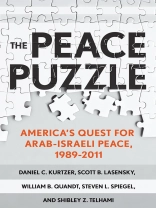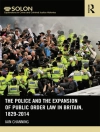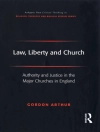Each phase of Arab-Israeli peacemaking has been inordinately difficult in its own right, and every critical juncture and decision point in the long process has been shaped by U.S. politics and the U.S. leaders of the moment. The Peace Puzzle tracks the American determination to articulate policy, develop strategy and tactics, and see through negotiations to agreements on an issue that has been of singular importance to U.S. interests for more than forty years.
In 2006, the authors of The Peace Puzzle formed the Study Group on Arab-Israeli Peacemaking, a project supported by the United States Institute of Peace, to develop a set of ‘best practices’ for American diplomacy. The Study Group conducted in-depth interviews with more than 120 policymakers, diplomats, academics, and civil society figures and developed performance assessments of the various U.S. administrations of the post–Cold War period. This book, an objective account of the role of the United States in attempting to achieve a lasting Arab–Israeli peace, is informed by the authors’ access to key individuals and official archives.
表中的内容
Introduction: The Decline of American Mideast Diplomacy
1. Opportunities Created, Opportunities Lost: Negotiations at Oslo and Madrid
2. Within Reach: Israeli- Syrian Negotiations of the 1990s
3. The Collapse of the Israeli- Palestinian Negotiations
4. George W. Bush Reshapes America’s Role
5. The Annapolis Denouement
6. Obama: An Early Assessment
Epilogue: Lessons Learned and UnlearnedNotes
Index
关于作者
Daniel C. Kurtzer is the S. Daniel Abraham Professor in Middle East Policy Studies at the Woodrow Wilson School of Princeton University. He retired in 2005 from the U.S. Foreign Service, having served as U.S. ambassador to Egypt (1997–2001) and Israel (2001–2005). He is coauthor with Scott B. Lasensky of Negotiating Arab-Israeli Peace: American Leadership in the Middle East. Scott B. Lasensky served as a senior researcher at the U.S. Institute of Peace from 2004 to 2011 and is coauthor (with Daniel C. Kurtzer) of Negotiating Arab-Israeli Peace: American Leadership in the Middle East. William B. Quandt is Edward R. Stettinius, Jr. Professor of Politics at the University of Virginia. His books include Peace Process: American Diplomacy and the Arab-Israeli Conflict since 1967. Steven L. Spiegel is Professor of Political Science and Director of the Center for Middle East Development at UCLA. He is the author of The Other Arab-Israeli Conflict: Making America’s Middle East Policy, from Truman to Reagan. Shibley Z. Telhami is the Anwar Sadat Professor of Peace and Development at the University of Maryland, College Park, and a Nonresident Senior Fellow at the Brookings Institution. He is the author of The Stakes: America in the Middle East and coeditor of Identity and Foreign Policy in the Middle East.












